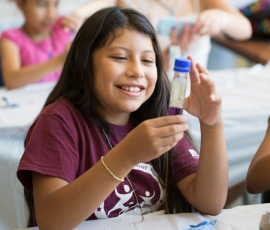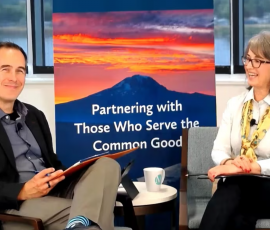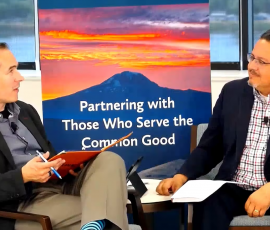“What do I need to do to become an effective philanthropist?”

This was the question recently posed to Mario Morino and Lowell Weiss, who work with nonprofit and foundation leaders through the Leap Ambassadors Community. The person asking the question was at the beginning of their philanthropic journey, and it’s an important question to ask both at many stages in the philanthropic cycle and of the many players involved in grantmaking—from a funder starting a new foundation to an organization celebrating its ten-year anniversary to organizations that have been making grants for decades, as well as the nonprofits that partner with foundations to serve their communities and for individuals evaluating their own giving practices.
For more than four decades, the Murdock Trust has participated in the philanthropic sector with numerous partner organizations, and we ask ourselves this question on a regular basis. This not only reminds us of the core of our mission, but it also allows us space to examine how the needs of the communities we serve have evolved and how we may need to evolve our practices to be a more effective partner.
Morino and Weiss identify five primary habits that make for an effective funder. Reviewing our own experience in this space, we find these five tips to be highly accurate and useful.
- “Effective foundations have talented, empathetic leaders.”
Foundations must be smart and strong but also empathetic. Lowell observes, “It’s probably not a coincidence that many [leaders] came to their foundation roles after spending significant time on the grant-seeker side of the funding equation.” This is true at the Murdock Trust, where our leadership and program directors have nonprofit backgrounds and understand firsthand the unique challenges that come with nonprofit leadership. An empathetic approach is central to Murdock Trust culture, which highly values relationship with our grantees and those we interact with in our sector. - “Effective foundations exemplify a growth mindset.”
Foundation leaders have expertise in the arenas they fund, but the nonprofits they serve have a lot to teach them from their experience and expertise working on the ground level. Including nonprofit leaders in the discussion is vital in working toward changing systemic issues in our communities. The Murdock Trust recognizes that the greatest body of expertise in serving the public good resides primarily with our grantees. To harness the knowledge of the nonprofits in our region, the Murdock Trust frequently convenes groups to address the numerous challenges facing the sector and our communities. A sample of these convenings is available on our website. - “Effective foundations help grantees strengthen their organizations, not just programs.”
By doing things like awarding multi-year grants, we hope to help nonprofits build their capacity over time, incrementally growing their ability to sustain new programs and staff until they can fully take it on. While grantmaking makes up much of what we do at the Murdock Trust, just as important are our Enrichment programs. Through programs like Board Leadership and Essentials of Development, Murdock Trust staff provide training opportunities for nonprofit boards, executive leadership and fundraising professionals to grow in effectiveness and success. - “Effective foundations cultivate strong relationships with grantees.”
Our grantees are more than just grant recipients to us. At the Murdock Trust, we see our grantees as partners who play an important role in helping us fulfill our mission. The fruits of our labor bloom on the trees of our nonprofit partners, and our mission comes to life when they are successful. We strive to deepen our relationships with our nonprofit partners by personal and individual attention to each applicant and grantee. For example, every nonprofit that applies for a grant receives an in-person site visit, and if a grant is awarded, the program director continues the relationship with the grantee by overseeing grant administration. From our grants process to our enrichment programs to our convenings and participation in the nonprofit sector, we strive to constantly build and deepen relationships. - “Effective foundations go to bat for their grantees with other funders.”
We do our best to help nonprofits grow—through our Enrichment programs, our convenings and the many resources we create and share—because we believe in our grantees and their missions. We love to share the stories of our grantees to help spread the word about their good work. It’s our hope that we can help connect our grantees to volunteers, donors and funders who resonate with their work and can support their missions. Check out the inspirational stories of our grantees on our blog or on our social media channels (Facebook, Instagram, Twitter and LinkedIn).
These five habits are more than just best practices. They’re the building blocks to being truly effective changemakers, both for funders and for nonprofits. We are deeply grateful to the talented nonprofits we work with throughout the Pacific Northwest who display these characteristics and live them out through their work. Your example inspires us to become better philanthropists every day, stewarding and shepherding your stories and work to make a great impact on our communities.
Looking for more ways to grow your organization and improve your grant applications? Check out the resources on our website.








